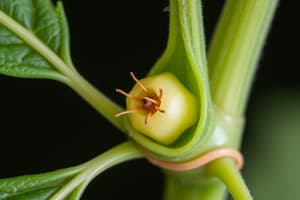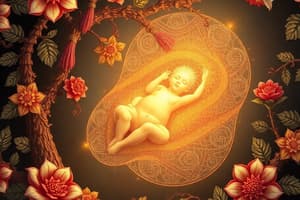Podcast
Questions and Answers
Where did Panchanan Maheshwari work before joining Delhi University?
Where did Panchanan Maheshwari work before joining Delhi University?
- Calcutta University
- Banaras Hindu University
- Dacca University (correct)
- Aligarh Muslim University
What is the significance of Panchanan Maheshwari's discovery in the technique of test-tube fertilization?
What is the significance of Panchanan Maheshwari's discovery in the technique of test-tube fertilization?
- It helps in studying plant morphology.
- It increases the growth rate of plants.
- It allows for the creation of new hybrid plants that could not previously be crossbred naturally. (correct)
- It is used to study plant diseases.
When was Panchanan Maheshwari's book on embryology of angiosperms published?
When was Panchanan Maheshwari's book on embryology of angiosperms published?
- 1949
- 1950 (correct)
- 1947
- 1945
What was the impact of Panchanan Maheshwari's work at Delhi University?
What was the impact of Panchanan Maheshwari's work at Delhi University?
How many publications did Panchanan Maheshwari have during his lifetime?
How many publications did Panchanan Maheshwari have during his lifetime?
How many publications have been credited to Panchanan Maheshwari's students?
How many publications have been credited to Panchanan Maheshwari's students?
What is the approximate age of flowering plants?
What is the approximate age of flowering plants?
What was a significant outcome of Maheshwari's techniques for in vitro fertilization?
What was a significant outcome of Maheshwari's techniques for in vitro fertilization?
What was Maheshwari's contribution to school education?
What was Maheshwari's contribution to school education?
What was the name of the scientific journal founded by Maheshwari?
What was the name of the scientific journal founded by Maheshwari?
What award was conferred upon Maheshwari by the Indian Botanical Society?
What award was conferred upon Maheshwari by the Indian Botanical Society?
What position was Maheshwari elected to in 1968?
What position was Maheshwari elected to in 1968?
Study Notes
Panchanan Maheshwari, born on November 9, 1904, was an eminent Indian botanist who made significant contributions to the field of plant embryology. He was known for his discovery in the technique of test-tube fertilization of angiosperms, which is a type of process involving fertilization where the egg is fused with the sperm outside the body, in a glass or test tube. This technique has allowed the creation of new hybrid plants that could not previously be crossbred naturally.
Before arriving at Delhi University in 1949, Maheshwari was at Dacca University from 1939. He worked on his landmark book, The embryology of angiosperms, between 1945 and 1947. Published in 1950, this book put Maheshwari and Delhi University on the global map.
Maheshwari established a flourishing school of research and teaching in plant biology at Delhi University. Under his leadership, the botany department at Delhi University became "a centre of world-wide influence in plant morphology, known both for its graduates and the many foreign investigators attracted to Delhi by its fame". He passed away in 1966 at the peak of his career.
Maheshwari was a prolific researcher with a bibliography from 1929 to his death including about 150 publications, many of them in the field of descriptive and comparative embryology. In addition, more than 300 publications have been credited to his students. His work on seed plants, particularly flowering ones, which are relatively recent arrivals (~250 million years old) compared to other plants which evolved over 800 million years ago, was an area of intense study in the late 19th and early 20th century.
Maheshwari's contributions to plant biology have had a lasting impact. After his death, his techniques for in vitro fertilization of flowering plants became well-established and are an important tool in plant breeding. It is possible to take a single cell from a mature plant and culture an entire plant, bypassing the requirement for fertilization and embryo formation. Maheshwari and his colleagues explored this method and made fundamental discoveries in the making of embryos from mature plant cells, creating an important route for research.
Maheshwari also emphasized the need for initiation of work on artificial culture of immature embryos, and encouraged general education. He made a significant contribution to school education by his leadership in bringing out the very first textbooks of Biology for Higher Secondary Schools published by NCERT in 1964.
In addition to his research achievements, Maheshwari was an educator and publisher. He taught Botany at the University of Delhi, establishing that department as a globally important center of research in embryology and tissue culture. He founded the scientific journal Phytomorphology (Plant Morphology), for which he served as chief editor until his death in 1966; and the more popular magazine Botanica. He also published texts to improve the standard of teaching life sciences in the schools.
Maheshwari was a scientific citizen of the world and many academies felt honoured to make him a Foundation Fellow. In 1934 he became a fellow of the Indian Academy of Sciences, Bangalore. The Indian Botanical Society honoured him with the Birbal Sahni Medal in 1958. He was the General President-elect of the Indian Science Congress Association for 1968, a role he could not fulfil on account of his untimely death on 18 May 1966. It was typical of him that he did not disclose this even to his family members, who learned it later only through newspapers.
In summary, Panchanan Maheshwari was a giant of plant biology, known for his discovery in the technique of test-tube fertilization of angiosperms, and his establishment of a flourishing school of research and teaching in plant biology at Delhi University. His contributions have had a lasting impact on the field of plant embryology and continue to influence research and education today.
Studying That Suits You
Use AI to generate personalized quizzes and flashcards to suit your learning preferences.
Description
Panchanan Maheshwari was a renowned Indian botanist who made significant contributions to plant embryology. He is known for his discovery of test-tube fertilization of angiosperms and his establishment of a prominent research school at Delhi University. His work has had a lasting impact on the field of plant biology and continues to influence research and education today.




